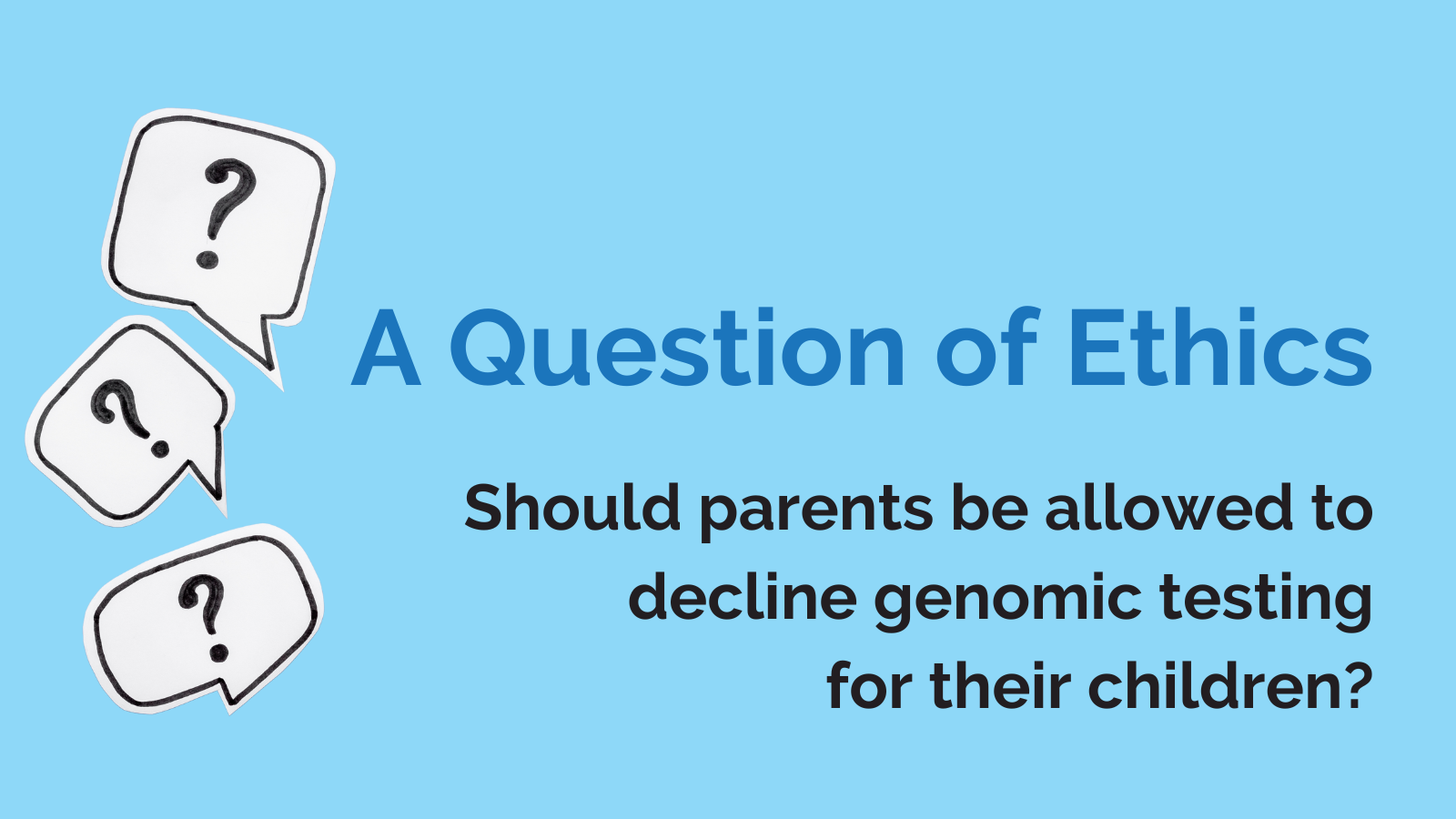
The ethical issues surrounding genomic testing are often complex and varied. A Question of Ethics is a four-part blog series by Australian Genomics, in collaboration with the Biomedical Ethics Research Group at the Murdoch Children’s Research Institute. It explores ethical situations a family might encounter when considering genomic testing for their child.
By Fiona Lynch, Danya Vears, Zornitza Stark and Chris Gyngell.

Genomic testing allows us to look at almost all the genes of a person at once.
Traditionally, genomic testing typically takes around four months to return a result. However, rapid genomic testing (RGT) can be used in critically ill babies and children to deliver results in a matter of days.
In some cases, RGT identifies diagnoses with lifesaving treatments. More commonly, it reduces the need for further painful and invasive tests.
And importantly, it saves healthcare costs – the money that it costs to perform genomic testing is recouped by the savings gained from changes in management.
Hundreds of tests are done each day in NICUs without explicit parental consent. Should RGT be treated differently?
Genomic testing is complex
A DNA sequence can provide much more information about a person than other diagnostic tests. In addition to helping diagnose a specific disease, it can reveal predispositions for a wide range of other health conditions, many of which only show up later in life. Because of this, genomic testing done in childhood can potentially have long-term implications for children, including for their ability to get life insurance. Genomic testing can also identify health-related and other information about a person’s family.
It is for these reasons that very detailed consent processes for genomic testing are required to ensure that families appreciate both the benefits and risks.
But is it realistic to expect parents to give fully informed consent when they are highly distressed due to their child’s illness? And is it fair to the child to delay testing to get consent when parents are unable to give it? And what happens if parents say ‘no’?
Sarina’s case – and others like it – raise these ethical issues.
Parents can make some decisions, but not others
Parents are allowed to make many decisions on behalf of their children – where to send them to school, what sports they play, and what foods they eat. However, there are some decisions that we, as a society, don’t let parents make. For example, parents are not allowed to physically harm their children, neglect them, or fail to educate them.
Parents are also responsible for making medical decisions on behalf of their children until they are mature enough to make decisions for themselves. As such, many medical procedures require parental consent to occur. However, there are exceptions to this rule. In emergency situations, where there isn’t enough time to get parental consent, procedures can be performed under a ‘presumed consent’ framework. Furthermore, some medical procedures can be performed where parents are actively withholding consent. If a procedure is deemed clearly in a child’s best interest – that is, the benefit clearly outweighs the risks – then a court can consent on the child’s behalf, overriding a parent’s refusal.
Normally, genomic testing is not performed in time critical, emergency situations. Likewise, genomic testing is often not a potentially lifesaving intervention for children. RGT brings genomic testing into these novel contexts. Because of this, we might need to start a broader conversation about parental consent for genomic testing.
The benefits of rapid genomic testing
Sarina’s health is deteriorating and further delays in diagnosing the cause of her seizures pose significant harms to her. While there may be negative effects of RGT, including the possibility of long-term insurance and privacy implications, these harms are probably less significant than the immediate risk to Sarina’s health.
Overall, we can say RGT will likely prevent harm to Sarina. At the very least, it will likely make a number of other investigations unnecessary. Secondly, RGT could identify a genetic cause with a potential treatment that could improve Sarina’s outcome. Finally, even if RGT shows that Sarina’s condition is not treatable and death is inevitable, knowing this can allow Sarina’s parents and her doctors to adjust her care accordingly and limit further suffering.
Importantly, our research shows that the vast majority (82%) of parents are happy with their decision to have RGT.
RGT presents a unique case where testing might need to be performed quickly for potentially life-saving treatments to be started. However, every family is unique, and we all make different decisions for our children.
As RGT is adopted in Australia and around the world, these ethical complexities will be important to keep in mind.
Read more
Rapid Genome Sequencing: Consent for New Technologies in the Neonatal Intensive Care Context. Lynch F, Prentice T, Gillam L, Stark Z, Gyngell C. Pediatrics. 2022 Dec 1;150(6):e2022058222. doi: 10.1542/peds.2022-058222.PMID: 36443237

